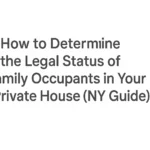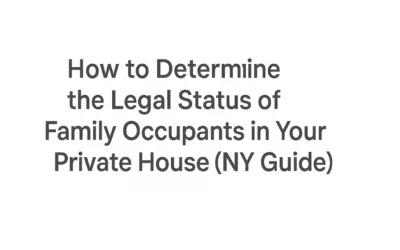New York property owners of unregulated houses need to be aware that evicting a tenant that does not have a lease in effect is different from evicting a tenant that does have a lease in effect. A tenant without a lease can be served with the appropriate notice of termination, whether 30, 60, or 90 days. And if the tenants do not move out by that time, the notice of petition and petition would then be filed and later served upon the tenant to start the holdover eviction. Although there is only one notice of termination, the specifics of that termination notice can significantly determine if the case will be challenged for dismissal. The matter would then be litigated in housing court.
Eviction Process for Tenants with a Lease in Effect
However, where a property owner intends to evict a tenant that has a lease in effect, the owner would need to take a different approach. The landlord would need to analyze the lease and the particular situation. If the apartment that the tenant is renting is illegal, even though there may be a lease agreement, the lease agreement will generally be invalidated by the illegality of the apartment. The lease will have to be evaluated for all of its sections and the particular violation to ensure that the lease agreement indicates that a particular violation would be sufficient for the landlord to terminate the lease. If the lease agreement does not state that a particular violation of the lease would be sufficient to evict the tenant, the tenant may argue that the landlord is without contractual authority to terminate the lease if the tenant does not cure the conduct that the landlord claims is in violation of the lease agreement. Therefore, even if the tenant is violating different sections of the lease, it would make sense to only claim those violations that are grounds for the landlord to move forward with evicting the tenant. Consideration also has to be given to the landlord’s ability to monitor and obtain evidence of the tenant’s conduct to determine if the tenant continues to violate the lease agreement after the tenant receives the 10-day notice.
Serving a Proper 10-Day Notice to Cure Violations
The landlord would need to serve the tenant with a proper 10-day notice to cure. The landlord’s notice would need to inform the tenant of the conduct that violates the lease. The landlord would have to inform the tenant of the particular sections of the lease that are being violated. The landlord would also have to inform the tenant what alteration in the tenant’s conduct would be necessary to cure the violations of the lease agreement. The landlord would also have to give the tenant the appropriate amount of time in which to cure the violations of the lease. This process is usually done by painstakingly analyzing the lease agreement for the particular clauses that the tenant is violating and then organizing the 10-day notice to reflect the tenant’s violative conduct of the particular lease agreement that the tenant is violating. The landlord has to serve this 10-day notice in the same manner as serving a notice of petition and petition under Real Property Actions and Proceedings Law § 735.
Monitoring Tenant Compliance and Serving a Termination Notice
Once the landlord has served the tenant with the 10-day notice to cure the conduct that violates the lease agreement, the landlord has to then monitor the tenant’s conduct and obtain evidence that the tenant continues to violate the lease agreement. Only after establishing that the tenant continues to violate the lease agreement after receiving the 10-day notice could the landlord then serve the tenant with the appropriate termination notice according to how long the tenant has been residing at the premises, whether 30, 60, or 90 days. If the tenant does not vacate the premises after the expiration of the termination notice, then the landlord can bring a holdover case against the tenant in the appropriate housing court.
Potential Legal Challenges in Tenant Eviction Cases
The tenant would then be able to challenge the 10-day notice, the termination notice, and the notice of petition and petition. Tenants commonly argue that the notices did not provide sufficient facts to allow them to create a strategy to defend the case. The tenant may also argue that the lease is being violated by the landlord. The tenant could also argue that the lease term relied upon by the landlord to evict the tenant does not provide the landlord with the authority to terminate the lease. In addition, the tenant can argue that the notices and petition were not properly served according to the law. Any of these defenses could result in the holdover case being dismissed by the court.
The Value of Experienced Legal Representation
Landlord-tenant cases can be quite complex. An experienced housing court litigation attorney can make all the difference to the success or failure of your case.









0 Comments